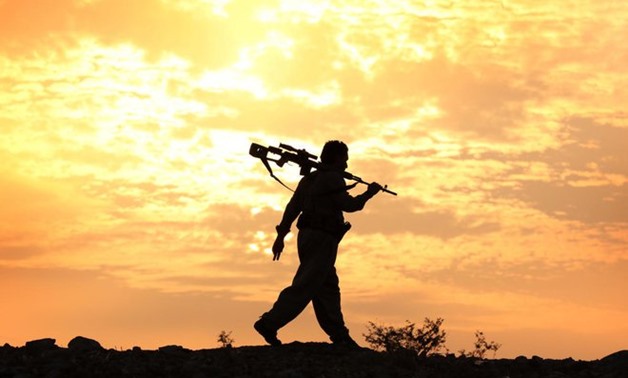
Iraqi Kurdistan has also proposed a cease-fire with Baghdad after some 30 Peshmerga fighters and members of Iraqi government and paramilitary forces died in earlier operations. AFP
CAIRO – 30 October 2017: The realities on the ground in Iraqi Kurdistan are changing at a rapid pace, and for the passive international observer, it is impossible to stay informed on the current state of affairs.
The opaque sheet of media censorship, which rolled into Kurdistan with the Iraqi and Hashd al-Shaabi Humvees, has created a space for militiamen to act unrestrained and unchecked. Combine a well-trained, well-armed, brutal and sectarian fighting force with their adversary, while boiling-off any oversight, and the situation is bound to become distressful.
With the arrival of Iraqi Security Forces and Hashd al-Shaabi militiamen to the disputed areas on the unfixed border with Iraqi Kurdistan, many Kurds who found themselves under the control of an outside force have suffered a plethora of abuses.
Burning civilian houses, beating and humiliating Kurdish residents, looting, forced removal of Kurdish signifiers and the censorship of Kurdish media outlets have dominated the public sphere.
In an escalation of tensions with the media, Arkan Sharifi, a Kurdish cameraman working with the Erbil-based Kurdistan TV, was brutally stabbed to death last night by a number of unidentified gunmen in the town of Daquq, south of Kirkuk.
“Last night, a number of unidentified masked gunmen stormed the house of our cameraman Arkan Sharifi, killing him,” Karwan Akraiy, the chief executive officer of Kurdistan TV, told Rudaw.
A member of Sharifi’s family told Rudaw that the gunmen spoke Turkmani, a Turkish dialect, as they stormed the cameraman’s house. His two daughters and son are now left without a father.
As Iraqi forces, Hashd al-Shaabi and Kurdish Peshmerga stood their ground on their respective side of the disputed border on October 16, the media occupied every space. Typical of modern media, everyone became a reporter and videos were sent in from far and wide to report on the unfolding clashes between the competing military forces.
For international observers, Rudaw and Kurdistan24 shined bright during this military offensive. With the respect of the Kurdish people, they gained access to a vast range of sources: from locals on the streets to the hierarchy of the Hashd al-Shaabi militia. Their influence over the western audience soon became a nuisance for Hashd al-Shaabi, and their inhumane action was displayed to the world.
 Iraqis gather as Iraqi forces arrive in the first neighbourhood on the southern outskirts of Kirkuk on October 16, 2017. AFP/Ahmad Al-Rubaye
Iraqis gather as Iraqi forces arrive in the first neighbourhood on the southern outskirts of Kirkuk on October 16, 2017. AFP/Ahmad Al-Rubaye
By October 18, Kirkuk was under the control of the Iraqi Security Forces and Hashd al-Shaabi, and the prevalence of the Kurdish media was challenged. The Kurdish media’s influence over the western audience soon became a nuisance for Hashd al-Shaabi as the militiamen’s inhumane action was displayed to the world.
On October 18, the first threats by Hashd al-Shaabi to Rudaw’s staff in particular were noted, and Rudaw’s presence dwindled.
In a move of increased aggression by Baghdad, Iraq’s Media and Communications Commission banned Rudaw Media Network entirely.
The words of Rudaw itself sum this up best:
“This decision by Iraq’s Media and Communications Commission is a political decision. It is against freedom of press and contradicts a government that calls itself democratic and committed to the constitution. Iraq’s constitution guarantees freedom of press in Iraq and does not allow the closure of any media.”
Iraq is falling into a dark trap that it may struggle to pull itself out from. Foreign intervention, uncontrolled armed men, a lack of oversight, and contradictory interpretations of the constitution all dominate the atmosphere. The rule of law seems to shift on a daily basis, and the upcoming elections are sure to only create further instability in the country.
Twitter:
Update:


Comments
Leave a Comment